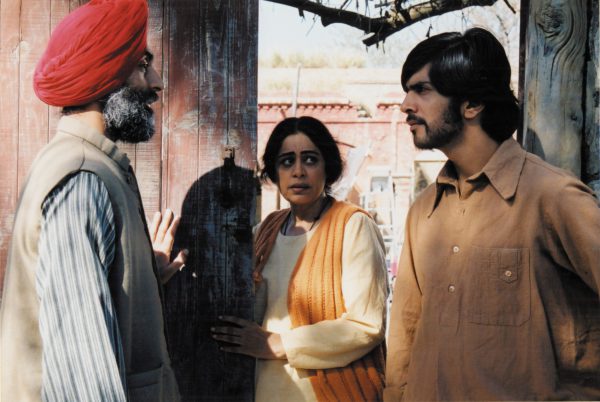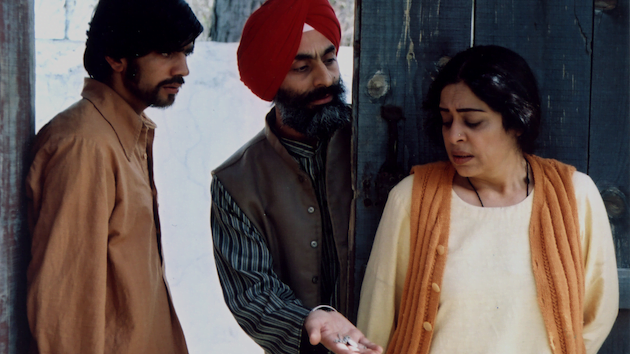Directed by Sabiha Sumar, originally hailing from Pakistan and living in New Delhi, Khamosh Pani was released in 2003. Khamosh Pani had won several awards since its release including the prestigious Golden Leopard at the 56th Locarno International Film Festival, Switzerland.

Image source: Times Of India
Brief History of the 1947 Massacre
Mainstream mass media has given us innumerable patriotic films since the Indian independence in 1947. Most of these movies either portray the sacrifice of our soldiers at the borders, or date back into the freedom struggle of the common man against the British rule. More often than not, men are shown on the big screen to be fighting bravely against the ‘others’ in order to save the honor of their family and their ‘motherland’.
Khamosh Pani is one of the rare movies, that bluntly show us the cost of independence that women had to pay way back in 1947, remnants of which still persists.
However, hardly do directors portray the plight of women that came as a huge cost to pay for our independence. The independence from British rule was accompanied by the Partition of India and Pakistan. And what accompanied Partition was, one of the largest mass migrations in the human history of the world.
The Unheard Voices of Women

Khamosh Pani is one of the rare movies, that bluntly show us the cost of independence that women had to pay way back in 1947, remnants of which still persists. The movie starts with a couple of monologues resonating the burden of independence that women had to bear which sends chills down the spine—
“Two countries were born
Men abducted women
Fathers killed their daughters
To save the honour
Some young girls die
Others survive
People moved like the sea
Leaving everything behind
Broken memories, half–dreamt dreams, places of worship…”
The Plot
The movie starts with the background of the year 1979 in Pakistan, when a massive socio-political uproar is set to take place. Aunt Ayesha, a widow portrayed by Kiron Kher lives with her only son Saleem, portrayed by Late Aamir Malik in the small village of Charkhi, located in the Punjab province of Pakistan. She is survived by her late husband’s pension, and preaches Quran to the village girls.
One thing that strikingly sets her apart, is the fact that she never goes to the village well, to fetch water for herself, like the other women of the village. Allabi and her daughter, Shano, fetch water for her. Ayesha is lovingly known as Chachi by everyone in the village. Saleem is in love with Zubeida, a happy go lucky ambitious girl portrayed by Shilpa Shukla, who studies in the village school.
Everything goes on well, until one day two revolutionists come from Lahore in order spread the fundamentalist Islamic principles directed under the leadership of Zia-ul-Haq. This happened around the same time when the President Zulfikar Ali Bhutto was hanged by Zia, and villagers were actually quite sad and skeptical about it. The men target the youth of the place in order to spread the fundamentalist principles under the name of Islam through the help of the landowner, Chaudhary.

Unfortunately, unemployed Saleem comes into their trap. The men believe that women not covering their heads is a threat to Islam. Saleem along with a couple of other extremists engage themselves in building higher walls around the girls’ school because according to them, women need to be protected among four walls. This group, even forces elders of the village to close their shops and make attending Namaaz compulsory. According to them, this is the rule of the Allah. They also clearly state that no traitors shall be allowed in Allah’s land, when some of the old men were defiant.
Ayesha tries a lot to talk sense to her son, that these politicians were just using religion for their own selfish purpose. The main motif of any religion is to spread love, respect and peace; not intolerance. But, the situation had gone way out of hand. The Saleem of today thinks Zubeida is corrupting him since, love marriage is not respectable in his culture, and secularism and democracy are anti-Islamic. Towards the end of the plot, it is showed that according to some new agreement between India and Pakistan, Sikhs would be allowed yearly to come visit their Guru Nanak’s shrine in Pakistan. In the midst of all these chaos, it so happens that one of Ayesha’s Sikh brother, manages to trace her sister “Veero” in Charkhi.
Yes! Veero is no one but Ayesha. She was the braveheart who managed to escape from jumping into the well in 1947, and fled away from her family. On her way, she was abducted and raped by Saleem’s father’s family. Finally, Saleem’s father sympathized at her situation, and decided to marry her so that she would no longer be known as an infidel woman in the eyes of the society. But this was a secret known hardly to one or two people in the neighborhood.
SO WHERE IS THE FREEDOM OR INDEPENDENCE HERE? OR HAVE WE REWRITTEN OUR HISTORY IN SUCH A WAY THAT WOMEN’S PLIGHTS HAVE NO PLACE IN THIS ‘GLORY’ OF INDEPENDENCE. THE STORY OF ‘VEERO’ OR ‘AYESHA’ IS REPRESENTATIVE OF EVERY SUCH ‘WOMAN’ WHOSE STORY OF SURVIVAL IS UNHEARD OR UNTOLD EVEN TODAY.
Today, her brother wants her to go back with him because their dying father wants to see his daughter for one last time. But, Veero refused to submit to her brother’s pleas. Although she refused to go back to India with her brother, she understood that nobody in the neighborhood and family, including her son would ever accept her again.
Eventually, she ends her life by jumping into the same well which she had avoided for the last 30 years; the same well where her mother and sister were forced to give up their lives in order to save the family’s honour. The movie ends with Saleem getting away with all his late mother’s belongings except for the locket, that belonged to Veero which he gave away to Zubeida. Thus, in a way Ayesha died, but Veero lived on.

Also read: Pinjar Review: The ‘Other’ Side of the India-Pakistan Partition
The Repressed Stories of Partition
Out of the 15 million people who set foot for migration, more than 1 million of them could not reach their destination ever. They were killed, raped or abducted. So where is the freedom or independence here? Or have we rewritten our history in such a way that women’s plights have no place in this ‘glory’ of independence. The story of ‘Veero’ or ‘Ayesha’ is representative of every such ‘woman’ whose story of survival is unheard or untold even today.
The value of women’s lives have been reduced to just being keepers of morals or ideals of the male members in their lives—father, husband, son. And as soon as they fail in keeping up with the patriarchal choices, death remains the only solution. And if actually women had sacrificed so much for the sake of independence, why is it never glorified? Why is being a rape survivor always a shame? Today, 72 years after our independence or rather Partition, these are some hard hitting questions that the society should really ask itself.
Also read: Urvashi Butalia: The Historian Who Revived The Forgotten Voices of Partition
References
Featured Image Source: TARSHI
About the author(s)
She is a Teacher. Hence she is a Leader.
She is a Leader. Hence she is a Teacher.



